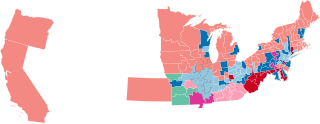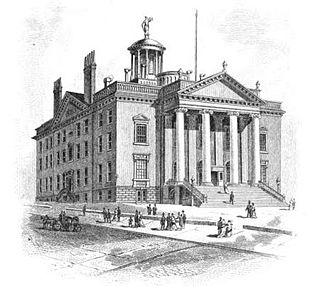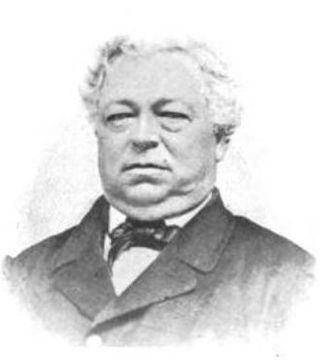
The New York City draft riots, sometimes referred to as the Manhattan draft riots and known at the time as Draft Week, were violent disturbances in Lower Manhattan, widely regarded as the culmination of white working-class discontent with new laws passed by Congress that year to draft men to fight in the ongoing American Civil War. The riots remain the largest civil and most racially charged urban disturbance in American history. According to Toby Joyce, the riot represented a "civil war" within the city's Irish community, in that "mostly Irish American rioters confronted police, [while] soldiers, and pro-war politicians ... were also to a considerable extent from the local Irish immigrant community."

The 1862–63 United States House of Representatives elections were held on various dates in various states between June 2, 1862, and November 3, 1863, during the American Civil War and President Abraham Lincoln's first term. Each state set its own date for its elections to the House of Representatives before the first session of the 38th United States Congress convened on December 7, 1863. The congressional reapportionment based on the 1860 United States census was performed assuming the seceded states were still in the union, increasing the number of congressional districts to 241. West Virginia was given three seats from Virginia after the former broke away from the latter to rejoin the union as a separate state. The seceded states remained unrepresented and left 58 vacancies. Republicans lost 22 seats and the majority, while Democrats gained 28.

The 38th United States Congress was a meeting of the legislative branch of the United States federal government, consisting of the United States Senate and the United States House of Representatives. It met in Washington, D.C. from March 4, 1863, to March 4, 1865, during the last two years of President Abraham Lincoln's first term in office. The apportionment of seats in the House of Representatives was based on the 1860 United States census. The Senate had a Republican majority, and the House of Representatives had a Republican plurality.

Horatio Seymour was an American politician. He served as Governor of New York from 1853 to 1854 and from 1863 to 1864. He was the Democratic Party nominee for president in the 1868 United States presidential election, losing to Republican Ulysses S. Grant.

Greene Carrier Bronson was an American lawyer and politician from New York.

Frederic Walker Lincoln Jr. was an American manufacturer and politician, serving as the sixteenth and eighteenth mayor of Boston, Massachusetts from 1858 to 1860 and 1863–1867, respectively.
Theophilus Carey Callicot was an American lawyer, newspaper editor and politician.

The 1866 New York state election was held on November 6, 1866, to elect the governor, the lieutenant governor, a Canal Commissioner and an Inspector of State Prisons, as well as all members of the New York State Assembly. Besides, the voters were asked if a Constitutional Convention should be held in 1867, which was answered in the affirmative with 352,854 votes for, and 256,364 against the convention.

The 1863 New York state election was held on November 3, 1863, to elect the Secretary of State, the State Comptroller, the Attorney General, the State Treasurer, the State Engineer, a Judge of the New York Court of Appeals, a Canal Commissioner and an Inspector of State Prisons, as well as all members of the New York State Assembly and the New York State Senate.

The 1863 United States Senate election in New York was held on February 3, 1863, by the New York State Legislature to elect a U.S. Senator to represent the State of New York in the United States Senate.

The 1868–69 United States Senate elections were held on various dates in various states. As these U.S. Senate elections were prior to the ratification of the Seventeenth Amendment in 1913, senators were chosen by state legislatures. Senators were elected over a wide range of time throughout 1868 and 1869, and a seat may have been filled months late or remained vacant due to legislative deadlock. In these elections, terms were up for the senators in Class 1.

William Russell Willcox was an American politician from New York. On January 1, 1905, he became the Postmaster of New York City. By 1909 he was chairman of the New York Public Service Commission. He served on the Railway Wage Commission in 1918.
War Democrats in American politics of the 1860s were members of the Democratic Party who supported the Union and rejected the policies of the Copperheads. The War Democrats demanded a more aggressive policy toward the Confederacy and supported the policies of Republican President Abraham Lincoln when the American Civil War broke out a few months after his victory in the 1860 presidential election.

The 1862–63 United States Senate elections were held on various dates in various states, occurring during the American Civil War. As these U.S. Senate elections were prior to the ratification of the Seventeenth Amendment in 1913, senators were chosen by state legislatures. Senators were elected over a wide range of time throughout 1862 and 1863, and a seat may have been filled months late or remained vacant due to legislative deadlock. In these elections, terms were up for the senators in Class 1.

The 86th New York State Legislature, consisting of the New York State Senate and the New York State Assembly, met from January 6 to April 25, 1863, during the first year of Horatio Seymour's second tenure as Governor of New York, in Albany.

Following is a table of United States presidential elections in West Virginia, ordered by year. Since its admission to statehood in 1863, West Virginia has participated in every U.S. presidential election. Prior to 1863, the territory currently comprising the state of West Virginia was part of the state of Virginia, and citizens residing in that area have thus been able to participate in every U.S. election.

The 1863 Confederate States House of Representatives election in Florida was held on Wednesday, November 4, 1863 to elect the two Confederate States Representatives from the state of Florida, one from each of the state's congressional districts, to represent Florida in the 2nd Confederate States Congress. The election coincided with the elections of other offices, including various state and local elections.

The 1864 Vermont gubernatorial election for governor of Vermont took place on September 6. Incumbent J. Gregory Smith was a candidate for reelection to a second one-year term, in keeping with the provisions of the Republican Party's "Mountain Rule". The Democratic nominee was Timothy P. Redfield, a former member of the Vermont Senate, the Free Soil Party's 1851 nominee for governor, and the Democratic nominee in 1863. In the general election, the Republican Party's dominance of Vermont politics continued, and Smith was easily reelected.

The 1863 New Hampshire gubernatorial election was held on March 10, 1863.